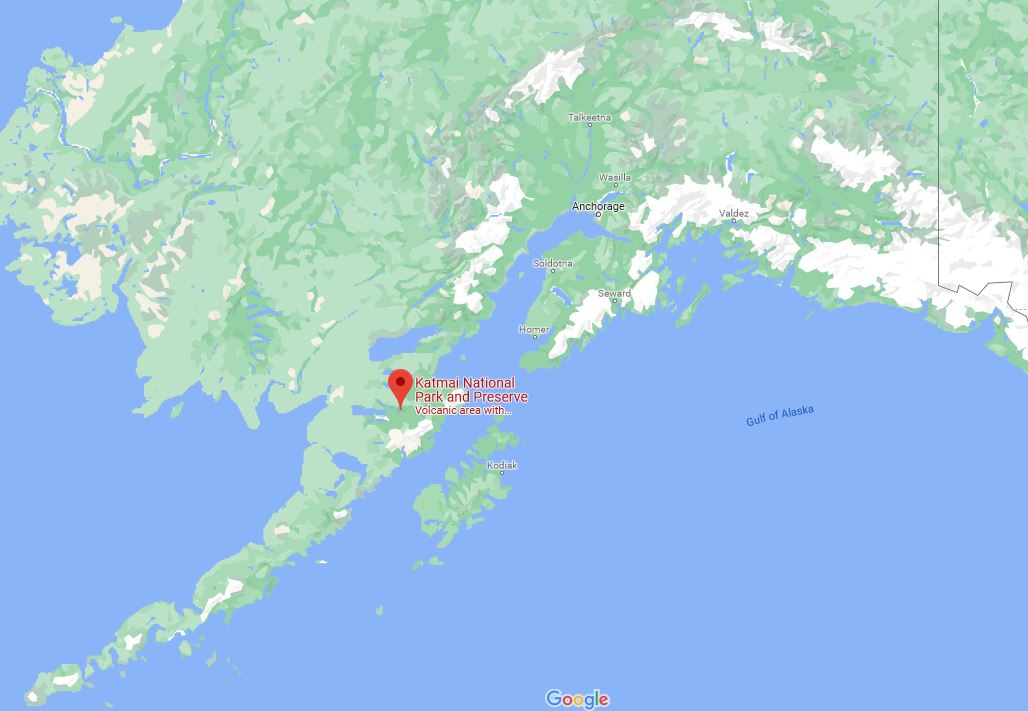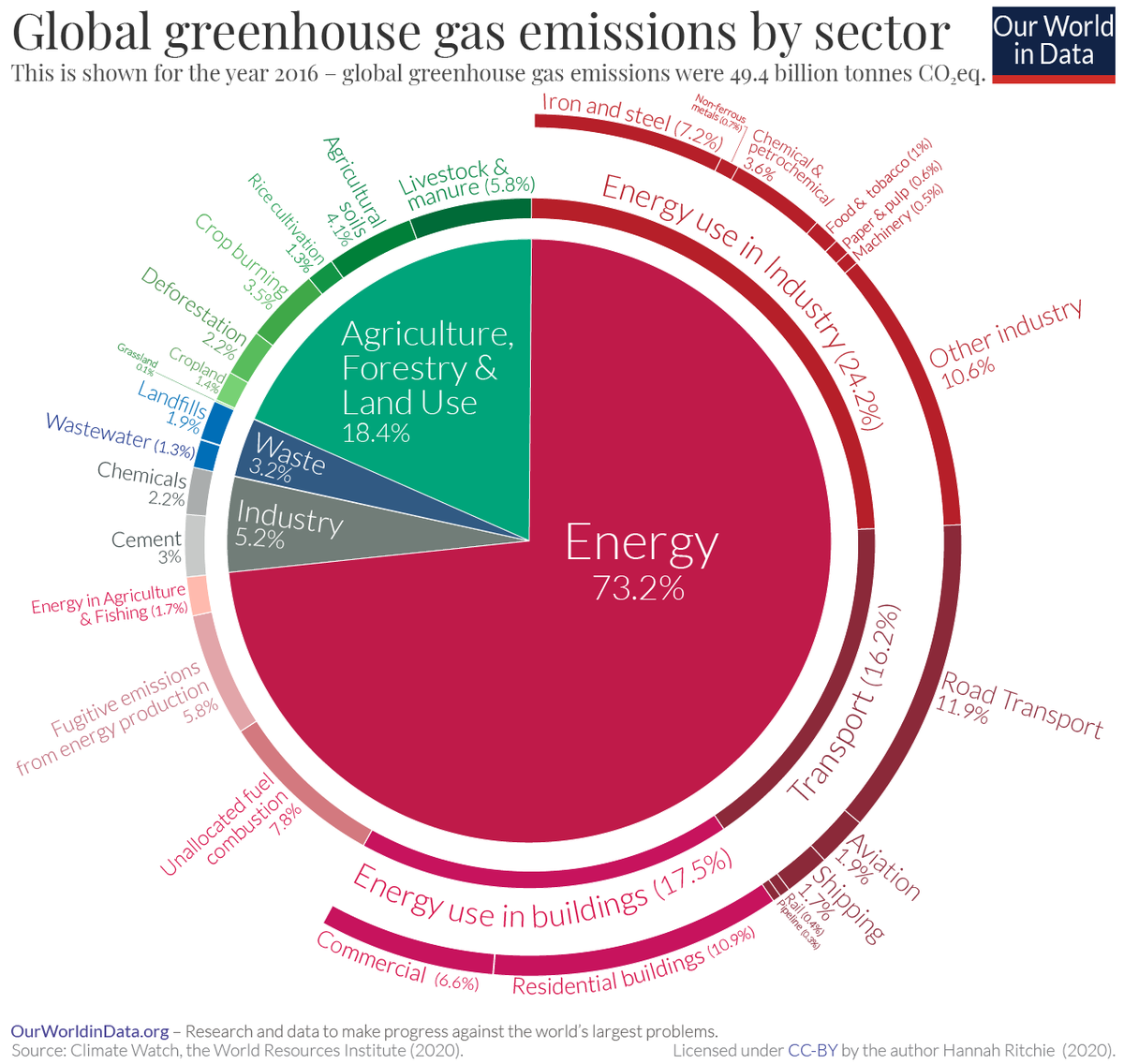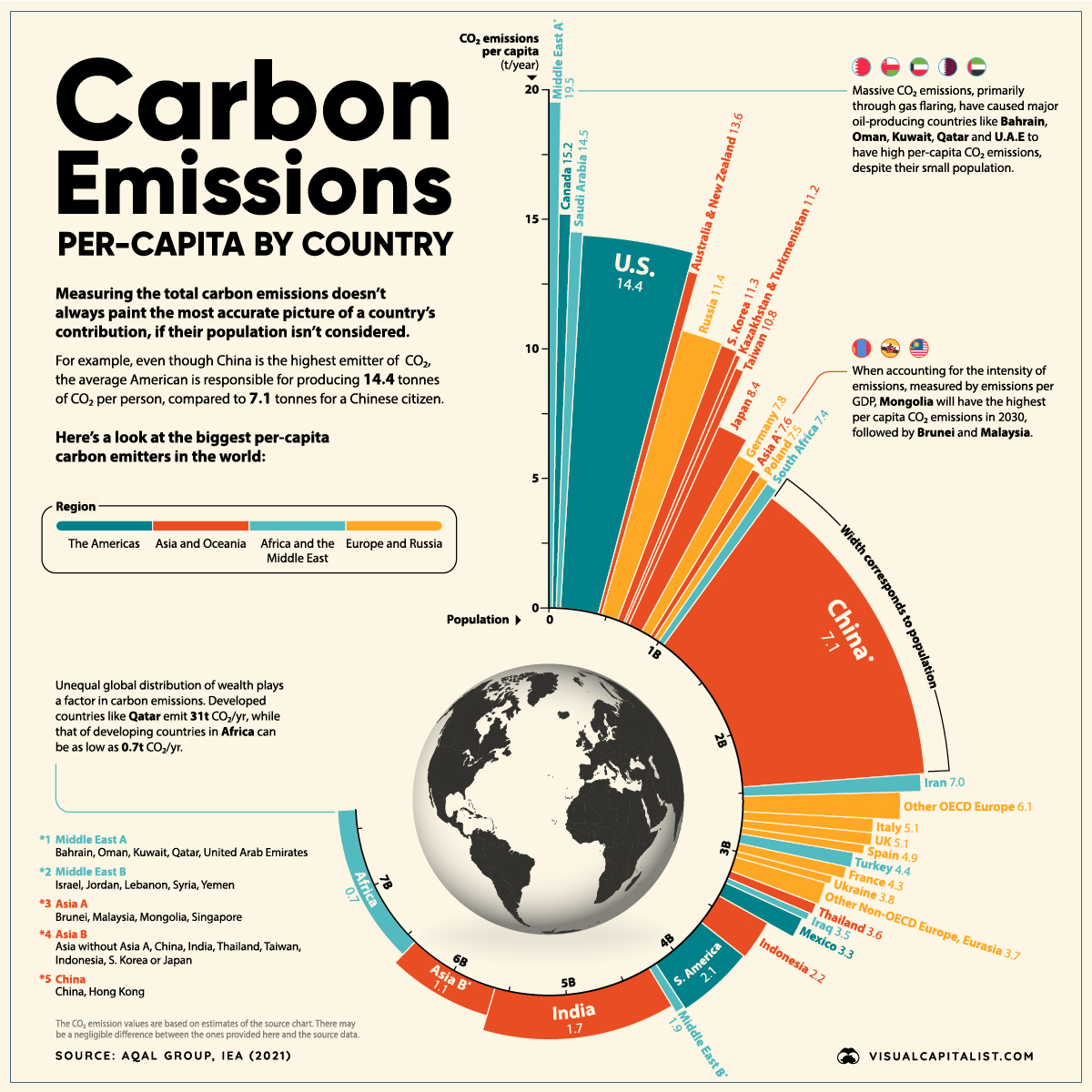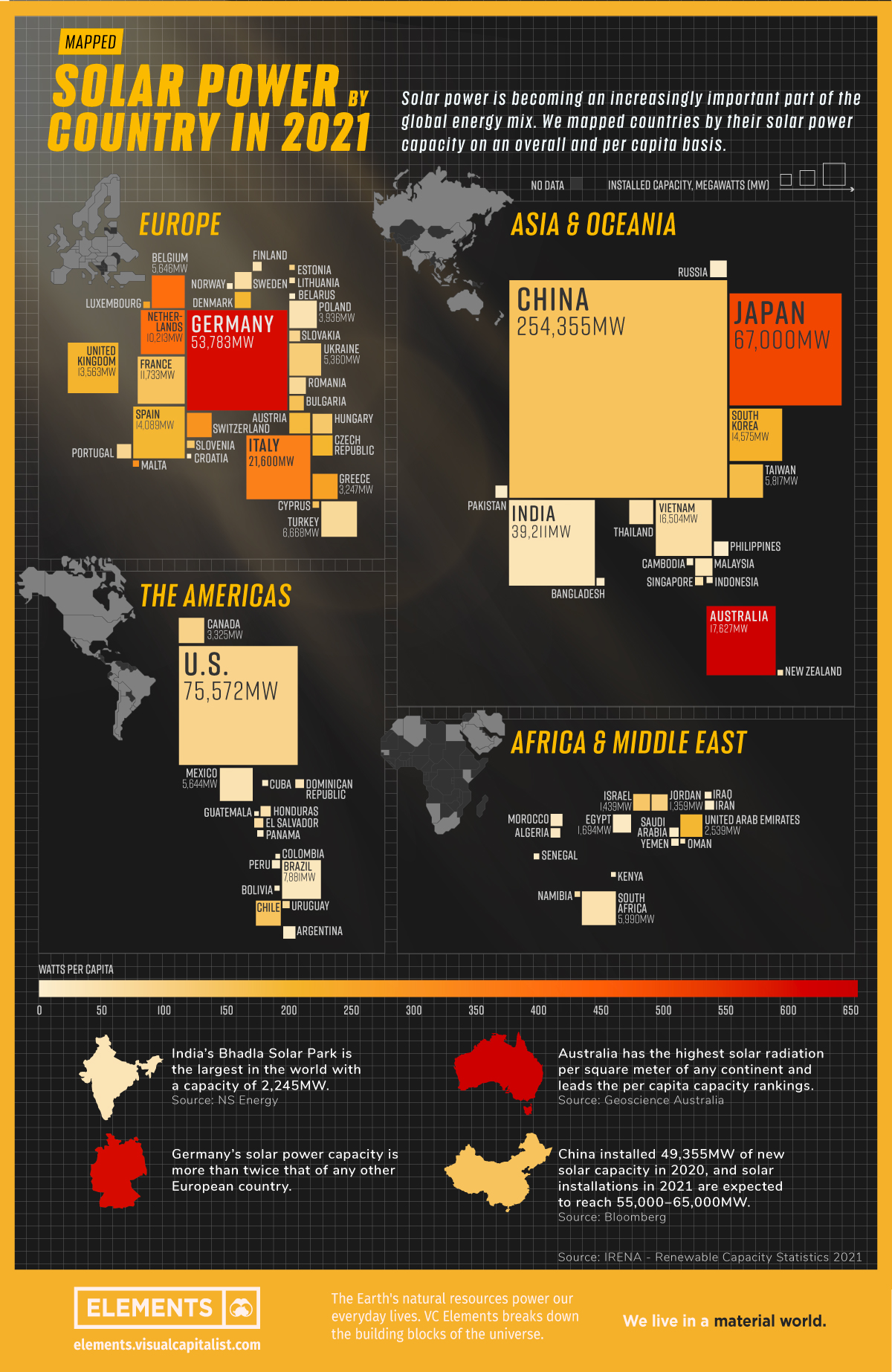Railroad Commission Issues Substantially Revised Rule on Critical Infrastructure
In response to substantial criticism of its original proposed rule, the Texas Railroad Commission has issued a final rule, 16 TAC Sec. 3.65, relating to designation of critical natural gas infrastructure. Well owners can no longer exempt their wells’ designation as critical infrastructure simply by filing a form and paying a $150 fee. The RRC will now itself classify gas wells, pipelines, gas plants and other natural gas facilities as critical based on its own criteria, and those facilities will be required to winterize. Gas supply facilities that require electricity to operate will be “critical customers” and are required to provide information to their electric suppliers.
The RRC will initiate a rulemaking later to adopt rules on what weatherization is required.
Countries’ Per Capita Carbon Emissions
From Visual Capitalist (click to enlarge): Note that the US has twice the CO2 emissions per capita of China.
Are we in for another Uri?
Excellent article in the Texas Tribune about the failure of the Texas Legislature and regulators to require natural gas companies to winterize in the wake of February’s winter storm blackout. The Public Utility Commission did finally act to require utilities to use “best efforts” to winterize their plants, but the Railroad Commission has so far done nothing to force gas infrastructure companies to winterize.
A joint report by the North American Electric Reliability Corporation and the Federal Energy Regulatory Commission found that “87 percent of unplanned generation outages due to fuel issues were related to natural gas, predominantly related to production and processing issues, while 13 percent involved issues with other fuels such as coal or fuel oil.”
According to Doug Lewin, and Austin-based energy consultant, Texas has done “next to nothing” to weatherize its natural gas supply. “We don’t have a regulatory system in place that holds the industry accountable. That is the problem,” Lewin said. “It’s not a technology or engineering problem. It’s a regulatory problem.”
Solar Farms vs. Oil and Gas Development
Today the Texas Supreme Court denied review of the El Paso Court of Appeals’ opinion in Lyle v. Midway Solar. I discussed the Court of Appeals’ opinion in a prior post. In brief, mineral owners sued a solar farm developer for constructing a solar farm on land under which they owed minerals, complaining that the solar developer had made no accommodation for mineral development. The Court of Appeals held that the mineral owners’ suit was premature because the minerals were unleased and there were no current plans for mineral development. Their suit was dismissed without prejudice.
If the Lyles exercise their right [to use the surface] as part of developing the minerals, Midway must yield to the degree mandated by the application of the accommodation doctrine. But if the Lyles are not exercising their right, there is nothing to be accommodated. Stated otherwise, until the Lyles seek to develop their minerals, Midway owes no duty to the Lyles respecting the surface usage. Were it otherwise a mineral owners who undertakes no efforts to develop the mineral estate could claim damages from any surface activities that might hinder—at some point in the future—the exploration for oil and gas.
China’s Lead in Solar Power
Excellent OpEd by Dr. Scott Tinker on UN Climate Conference and Critique of IEA Report “Net Zero by 2050: A Roadmap for the Global Energy Sector”
Scott Tinker says “The Road to Glasgow is Paved with Bad Assumptions.” No one knows more about the economics of climate change than Scott Tinker.
Texas Senators Grill Railroad Commission Executive Director Wei Wang About Natural Gas Industry Winterization
According to an article in The Texas Tribune, senators on the Senate Business and Commerce Committee were frustrated that the Railroad Commission had not done more to require natural gas producers, processors and pipelines to winterize their systems. In a committee hearing on Tuesday, they castigated Commission Executive Director Wei Wang for not moving faster. They did not seem to realize that the Commission was following the timeline set out in Senate Bill 3, passed in the last regular session to address the power loss across the state last February.
As I’ve posted, the Commission has proposed a rule requiring the gas producers, processors and pipelines to designate whether they are critical infrastructure, but the statute allows the industry to opt out of that category if they want to, a loophole that seemed to surprise and frustrate the senators. Wang pointed out that the Commission’s proposed rule mirrors the language of Senate Bill 3, which seemed not to mollify the senators, who demanded immediate action from the Commission.
The statute provides that a committee will map out the state’s energy infrastructure by September 2022, after which the Commission will have 180 days to finalize weatherization rules, a timeline the senators also criticized. As the Texas Tribune reported, “Energy experts said lawmakers have themselves to blame if they wanted the state’s natural gas infrastructure, which sends fuel to many of Texas’ largest power plants, to be weatherized quickly — or at all. ‘The Legislature left this loophole open,’ said Doug Lewin, an Austin-based energy and climate consultant.”
Something Completely Different: Fat Bear Week
Katmai National Park on the Alaska Peninsula is the most remote of our national parks, accessible only by boat or plane. It is also prime habitat for bears.
Fat Bear Week is September 29 through Tuesday, October 5. The bears in Katmai are fishing for salmon to fatten up for the winter, and this week the are at their most rotund. Rangers create a bracket pitting indivudual bears against each other for the honor of being named champion Fat Bear, and the public then votes. Last year’s winner was the bear identified as 747, weighing in at 1400 pounds. You can see the contestants and vote here: https://explore.org/fat-bear-week. Here is the bracket (click to enlarge):
You can see the contestants and vote here: https://explore.org/fat-bear-week. Here is the bracket (click to enlarge):

You can get before-and-after photos of the contestants, along with their biographies, here. You can also watch live cams of bears feasting on Katmai’s website, here.
Report Out on Christi Craddick Conflicts of Interest at Texas Railroad Commission
Commission Shift, a non-profit advocacy organization formed “to hold the Railroad Commission of Texas accountable to its mission,” has issued a detailed report on conflicts of interest policies at the Texas Railroad Commission and the need for reform. The report examines Commissioner Christi Craddick’s ties to the industry regulated by the RRC. Future reports will focus on the other Commissioners.
Commission Shift previously issued a critique of the RRC’s annual monitoring and enforcement plan for FY 2022, and a report on the growing orphan well problem in Texas, “Unplugged and Abandoned.” House Bill 3973, passed in the last regular legislative session, created a committee to study abandoned wells.






